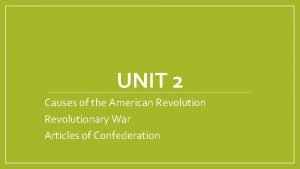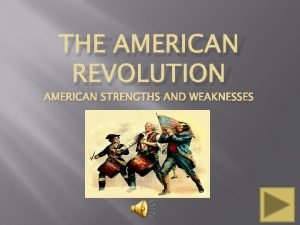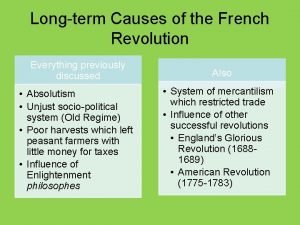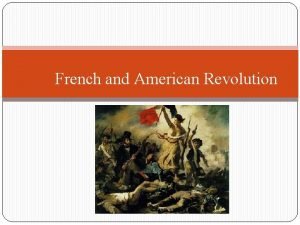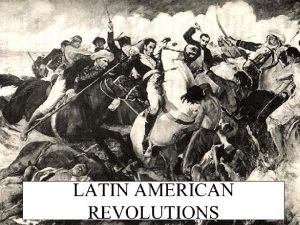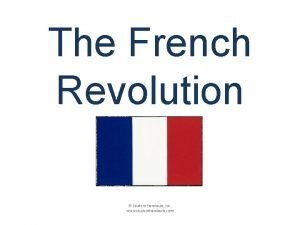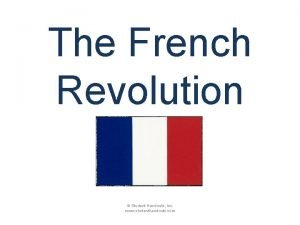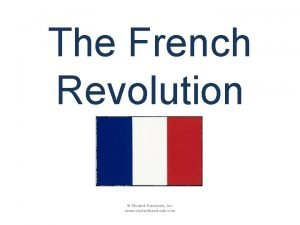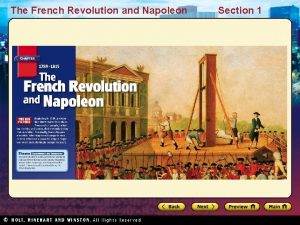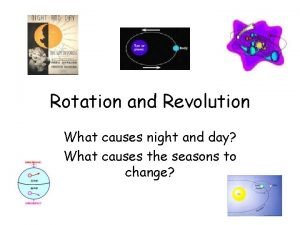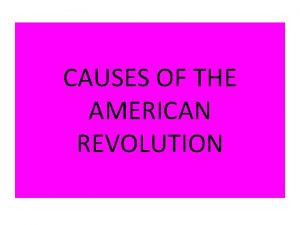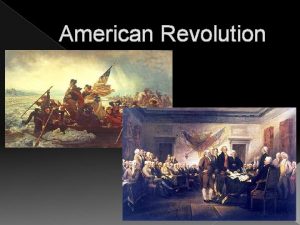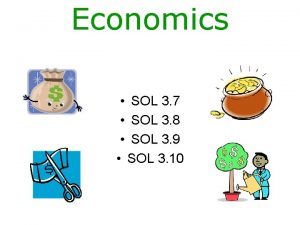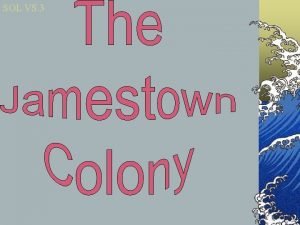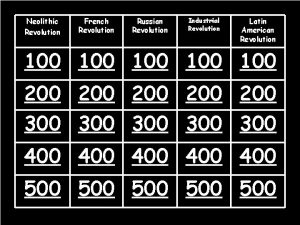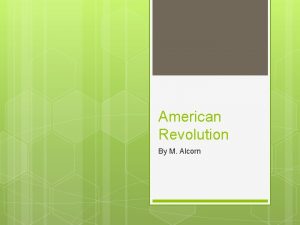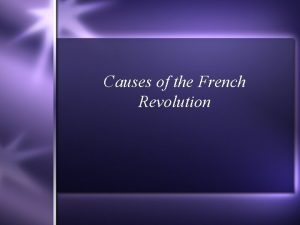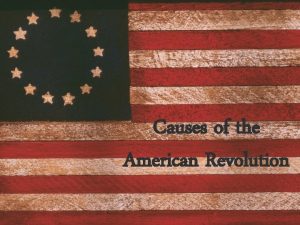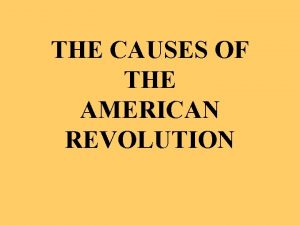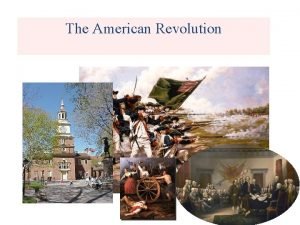The Causes of the American Revolution SOL 4























- Slides: 23

The Causes of the American Revolution SOL 4

The French & Indian War ▪ The French and Indian War was a component of a wider struggle between European powers. It resulted in British dominance of North America and increased tensions between Britain and its North American colonies. ▪ The French and Indian War ▪ Caused by conflict between Britain and France over territory and resources ▪ Was the first step on the road to the American Revolution ▪ Colonials, including military leader George Washington, participated in the British war effort

Results of the French and Indian War ▪ Terms of the Treaty of Paris, 1763= Proclamation of 1763 ▪ British war debt ▪ Increased tension between Britain and its colonies resulted as Britain shifted from its policy of salutary neglect to a more active role in colonial affairs beginning with the Proclamation of 1763

Proclamation of 1763

The Enlightenment Effected the Ideas of the Colonists ▪ The foundations of American government lie in seventeenth- and eighteenth-century English Common Law, the parliamentary systems, and the European Enlightenment movement. ▪ The Founding Fathers blended the colonial governmental system with Enlightenment political philosophies to shape the new nation.

Key political ideas of the Enlightenment ▪ Natural rights ▪ Ordered liberty ▪ Consent of the governed ▪ Separation of church and state ▪ Social Contract ▪ Separation of powers

The Enlightenment Inspired Revolutions ▪ The American Revolution was inspired by ideas concerning natural rights and political authority, and its successful completion affected people and governments throughout the world for many generations. ▪ The revolutionary generation formulated the political philosophy and laid the institutional foundations for the system of government under which Americans live. ▪ New political ideas about the relationship between people and their government helped to justify the Declaration of Independence.

The Declaration of Independence ▪ The Declaration of Independence was inspired by ideas concerning natural rights and political authority that laid the institutional foundations for the system of government that ultimately unified the American people. ▪ The eventual draft of the Declaration of Independence, authored by Thomas Jefferson of Virginia, reflected the ideas of John Locke and Thomas Paine. Pain

Ideas of John Locke ▪ Locke’s writings on “natural rights, ” “social contract, ” “ordered liberty, ” and “consent of the governed” were incorporated when Jefferson wrote: ▪ “We hold these truths to be self-evident, that all men are created equal, that they are endowed by their Creator with certain unalienable Rights, that among these are Life, Liberty, and the pursuit of Happiness. ” ▪ “That to secure these rights, Governments are instituted among Men, deriving their just powers from the consent of the governed. ” ▪ “That whenever any Form of Government becomes destructive of these ends, it is the Right of the People to alter or abolish it, and to institute new Government…”


Common Sense ▪ Paine’s Common Sense challenged the rule of the American colonies by the King of England. It was read by many American colonists and contributed to the growing sentiment for independence from Great Britain. Jefferson incorporated into the Declaration of Independence many of the grievances against the King of England that Paine had outlined in Common Sense.

Causes of the Revolution & Declaration of Independence ▪ The ideas of the Enlightenment and the perceived unfairness of British policies by some Americans provoked debate and resistance by the American colonists.

The road to revolution: Changes in British policy led to the American Revolution ▪ Taxation policy: Parliament enacted several revenue-raising taxes to pay for the costs incurred from the French and Indian War and for British troops to protect the colonists throughout the 1760 s and 1770 s, including the: – Sugar Act – Stamp Act

Resistance to Taxes – Sons of Liberty – Townshend Acts. These acts were protested by some colonists through boycotts, intimidation, and violence.


The Intolerable Acts ▪ Civil liberties: Some American colonists believed their civil liberties as Englishmen were violated by the British government through its use of writs of assistance and the Quartering Act. ▪ Military maneuvers: Some American colonists believed the employment of the Quartering Act, martial law, and the closing of Boston Harbor were clear violations of their rights.

The beginning of the American Revolution ▪ Resistance to British rule in the colonies mounted, leading to war: ▪ The First Continental Congress was called, to which all of the colonies except Georgia sent representatives— the first time most of the colonies had acted together. ▪ War began when the Minutemen in Massachusetts fought a brief skirmish with British troops at Lexington and Concord.

▪ The Second Continental Congress was called, to which all colonies eventually sent representatives. ▪ Members of the Continental Congress selected George Washington as commander in chief of the Continental Army and debated the issue of independence.

Differences among the colonists ▪ The colonists were divided into three main groups during the Revolution: ▪ Patriots – Believed in complete independence from Britain – Inspired by the ideas of Locke and Paine and the words of Virginian Patrick Henry (“Give me liberty, or give me death!”) – Provided the troops for the American Army, led by Virginian George Washington

▪ Loyalists (Tories) – Remained loyal to Britain because of cultural and economic ties – Believed that taxation of the colonies was justified to pay for British troops to protect European settlers from American Indian attacks ▪ Neutrals – The many colonists who tried to stay as uninvolved in the war as possible

The American Revolution ▪ Competing factors in Europe led to the American victory over the British. ▪ Despite Britain’s military superiority, the colonists achieved victory in the American Revolution through the efforts of colonial military and political leaders.

Competing advantages of the opposing forces ▪ Britain had a more powerful military, as its army was well-trained and well-equipped, along with a superior navy; however, the war continued to lose popular support in Britain. ▪ American colonists had the advantages of fighting a defensive war and having a committed political leadership.

Developments leading to colonial victory in the Revolutionary War ▪ American victory at the Battle of Saratoga led to the Treaty of Alliance negotiated by Ben Franklin with France ▪ American victory at the Battle of Yorktown under the command of George Washington with the assistance of the French army and navy
 Causes of the american revolutionary war
Causes of the american revolutionary war American revolution strengths and weaknesses
American revolution strengths and weaknesses Long term causes french revolution
Long term causes french revolution Effect of the american revolution
Effect of the american revolution Causes of the american revolution gallery walk
Causes of the american revolution gallery walk Latin american revolution causes
Latin american revolution causes Economic causes of french revolution
Economic causes of french revolution Contoh koloid
Contoh koloid Proximate causation vs ultimate causation
Proximate causation vs ultimate causation Proximate behaviour in animals
Proximate behaviour in animals Why do we have seasons
Why do we have seasons Causes and effects of the russian revolution
Causes and effects of the russian revolution French revolution causes and effects
French revolution causes and effects Committee of public safety
Committee of public safety French revolution causes
French revolution causes Short term causes of the french revolution
Short term causes of the french revolution Immediate cause of french revolution
Immediate cause of french revolution Political causes
Political causes French revolution causes
French revolution causes Causes and effects of french revolution
Causes and effects of french revolution Storming of the bastille cartoon
Storming of the bastille cartoon Haitian revolution causes
Haitian revolution causes Revolution rotation difference
Revolution rotation difference French revolution causes and effects
French revolution causes and effects
